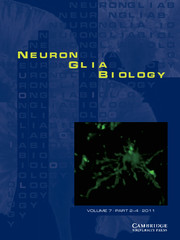Crossref Citations
This article has been cited by the following publications. This list is generated based on data provided by
Crossref.
Ma, Dengke K
Marchetto, Maria Carolina
Guo, Junjie U
Ming, Guo-li
Gage, Fred H
and
Song, Hongjun
2010.
Epigenetic choreographers of neurogenesis in the adult mammalian brain.
Nature Neuroscience,
Vol. 13,
Issue. 11,
p.
1338.
Fields, R. Douglas
2010.
Central role of glia in disease research.
Neuron Glia Biology,
Vol. 6,
Issue. 2,
p.
91.
Lopez-Atalaya, Jose P
Ciccarelli, Alessandro
Viosca, Jose
Valor, Luis M
Jimenez-Minchan, Maria
Canals, Santiago
Giustetto, Maurizio
and
Barco, Angel
2011.
CBP is required for environmental enrichment-induced neurogenesis and cognitive enhancement.
The EMBO Journal,
Vol. 30,
Issue. 20,
p.
4287.
Mateus-Pinheiro, António
Pinto, Luísa
and
Sousa, Nuno
2011.
Epigenetic (de)regulation of adult hippocampal neurogenesis: implications for depression.
Clinical Epigenetics,
Vol. 3,
Issue. 1,
Ming, Guo-li
and
Song, Hongjun
2011.
Adult Neurogenesis in the Mammalian Brain: Significant Answers and Significant Questions.
Neuron,
Vol. 70,
Issue. 4,
p.
687.
Sun, Jiaqi
Sun, Jiawei
Ming, Guo‐li
and
Song, Hongjun
2011.
Epigenetic regulation of neurogenesis in the adult mammalian brain.
European Journal of Neuroscience,
Vol. 33,
Issue. 6,
p.
1087.
Sun, Guoqiang
Fu, Chelsea
Shen, Caroline
Shi, Yanhong
and
Matthias, Patrick
2011.
Histone Deacetylases in Neural Stem Cells and Induced Pluripotent Stem Cells.
BioMed Research International,
Vol. 2011,
Issue. 1,
Dhaliwal, Jagroop
and
Lagace, Diane C.
2011.
Visualization and genetic manipulation of adult neurogenesis using transgenic mice.
European Journal of Neuroscience,
Vol. 33,
Issue. 6,
p.
1025.
Pollina, E A
and
Brunet, A
2011.
Epigenetic regulation of aging stem cells.
Oncogene,
Vol. 30,
Issue. 28,
p.
3105.
Santos, Tiago
Maia, João
Agasse, Fabienne
Xapelli, Sara
Ferreira, Lino
and
Bernardino, Liliana
2012.
Nanomedicine boosts neurogenesis: new strategies for brain repair.
Integrative Biology,
Vol. 4,
Issue. 9,
p.
973.
Reichert, Nina
Choukrallah, Mohamed-Amin
and
Matthias, Patrick
2012.
Multiple roles of class I HDACs in proliferation, differentiation, and development.
Cellular and Molecular Life Sciences,
Vol. 69,
Issue. 13,
p.
2173.
Bespalov, Anton
Klein, Corinna
Behl, Berthold
Gross, Gerhard
and
Schoemaker, Hans
2012.
Novel Antischizophrenia Treatments.
Vol. 213,
Issue. ,
p.
419.
Jiang, Yindi
and
Hsieh, Jenny
2012.
Harnessing Adult Neurogenesis By Cracking the Epigenetic Code.
Future Neurology,
Vol. 7,
Issue. 1,
p.
65.
Mohamed Ariff, Iqbal
Mitra, Arinjay
and
Basu, Anirban
2012.
Epigenetic regulation of self‐renewal and fate determination in neural stem cells.
Journal of Neuroscience Research,
Vol. 90,
Issue. 3,
p.
529.
Morris, Michael J.
and
Monteggia, Lisa M.
2013.
Unique functional roles for class I and class II histone deacetylases in central nervous system development and function.
International Journal of Developmental Neuroscience,
Vol. 31,
Issue. 6,
p.
370.
Vadodaria, Krishna C.
Brakebusch, Cord
Suter, Ueli
and
Jessberger, Sebastian
2013.
Stage-Specific Functions of the Small Rho GTPases Cdc42 and Rac1 for Adult Hippocampal Neurogenesis.
The Journal of Neuroscience,
Vol. 33,
Issue. 3,
p.
1179.
Gräff, Johannes
and
Tsai, Li-Huei
2013.
The Potential of HDAC Inhibitors as Cognitive Enhancers.
Annual Review of Pharmacology and Toxicology,
Vol. 53,
Issue. 1,
p.
311.
Summers, Alyssa R.
Fischer, Melissa A.
Stengel, Kristy R.
Zhao, Yue
Kaiser, Jonathan F.
Wells, Christina E.
Hunt, Aubrey
Bhaskara, Srividya
Luzwick, Jessica W.
Sampathi, Shilpa
Chen, Xi
Thompson, Mary Ann
Cortez, David
and
Hiebert, Scott W.
2013.
HDAC3 is essential for DNA replication in hematopoietic progenitor cells.
Journal of Clinical Investigation,
Vol. 123,
Issue. 7,
p.
3112.
Morris, Michael J.
Mahgoub, Melissa
Na, Elisa S.
Pranav, Heena
and
Monteggia, Lisa M.
2013.
Loss of Histone Deacetylase 2 Improves Working Memory and Accelerates Extinction Learning.
The Journal of Neuroscience,
Vol. 33,
Issue. 15,
p.
6401.
Wang, Yajie
Zhang, Yan-Ling
Hennig, Krista
Gale, Jennifer P.
Hong, Yijia
Cha, Anna
Riley, Misha
Wagner, Florence
Haggarty, Stephen J.
Holson, Edward
and
Hooker, Jacob
2013.
Class I HDAC imaging using [3H]CI-994 autoradiography.
Epigenetics,
Vol. 8,
Issue. 7,
p.
756.


